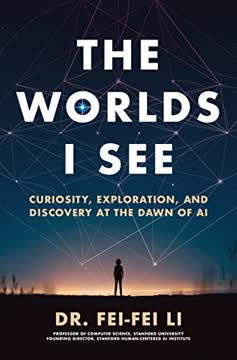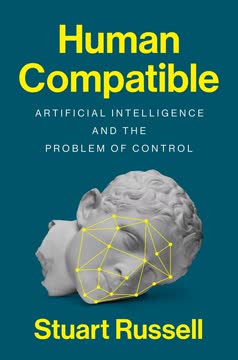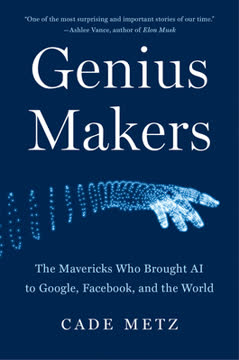Key Takeaways
1. The Rise of Deep Learning: From Academic Fringe to Industry Revolution
"Old ideas are new."
Neural networks resurgence. Deep learning, a revitalized approach to artificial intelligence based on neural networks, emerged from decades of academic research to revolutionize the tech industry. This resurgence was driven by:
- Increased computing power, especially GPU chips
- Availability of massive datasets for training
- Refinement of algorithms like backpropagation
The technology rapidly improved tasks such as:
- Speech recognition
- Image classification
- Language translation
- Game playing
Major tech companies like Google, Facebook, and Microsoft invested heavily in deep learning research and talent, leading to a fierce competition for top researchers and rapid advancements in AI capabilities.
2. Pioneers of Neural Networks: Hinton, LeCun, and Bengio's Persistence
"If you have an idea and it seems to you it has to be right, don't let people tell you it's silly. Just ignore them."
Decades of dedication. Geoffrey Hinton, Yann LeCun, and Yoshua Bengio persevered in their belief in neural networks despite widespread skepticism from the AI community. Their persistence eventually led to:
- Breakthrough improvements in speech and image recognition
- The revival of neural networks as a dominant AI approach
- Recognition with the Turing Award, the "Nobel Prize of computing"
Key contributions:
- Hinton: Backpropagation algorithm, deep belief networks
- LeCun: Convolutional neural networks for image recognition
- Bengio: Natural language processing and generative models
Their work laid the foundation for the deep learning revolution and inspired a new generation of AI researchers and practitioners.
3. Breakthroughs in Speech and Image Recognition Transform Tech Giants
"I was definitely thinking I was right the whole time."
Industry-wide impact. Breakthroughs in speech and image recognition driven by deep learning transformed the strategies and products of major tech companies:
- Google: Improved speech recognition on Android phones
- Facebook: Enhanced image recognition and content moderation
- Microsoft: Advanced machine translation capabilities
Key milestones:
- 2012: AlexNet wins ImageNet competition, sparking industry interest
- 2016: Google's neural machine translation system surpasses traditional methods
- 2018: DeepMind's AlphaGo defeats world champion Go player
These advancements demonstrated the power of deep learning and led to widespread adoption across the tech industry, reshaping products and services used by billions of people worldwide.
4. The AI Arms Race: Competition and Collaboration Among Tech Companies
"There are people in Russia whose job it is to try to exploit our systems. So this is an arms race, right?"
Global AI competition. The rapid progress in AI sparked an intense race among tech giants and nations to develop and control advanced AI technologies:
- Aggressive hiring and acquisition of AI talent and start-ups
- Massive investments in AI research and infrastructure
- Competition for dominance in cloud computing and AI services
Notable developments:
- Google's acquisition of DeepMind for $650 million
- China's national AI initiative to become world leader by 2030
- OpenAI's formation as a counterweight to corporate AI development
The competition drove rapid advancements but also raised concerns about the concentration of AI power and the potential for misuse of the technology.
5. Ethical Concerns and Societal Impact of Rapidly Advancing AI
"Google Photos, y'all fucked up. My friend is not a gorilla."
Unintended consequences. The rapid advancement of AI technologies brought to light significant ethical concerns and societal impacts:
- Bias in AI systems, particularly in facial recognition
- Privacy concerns related to data collection and use
- Potential job displacement due to automation
- Weaponization of AI and autonomous weapons
Key issues:
- Racial and gender bias in facial recognition systems
- Spread of deepfakes and AI-generated misinformation
- Ethical dilemmas in AI-driven decision making
- Need for diverse representation in AI development
These concerns led to calls for responsible AI development, increased regulation, and the formation of AI ethics boards within companies and academic institutions.
6. From Games to Real-World Applications: AI's Expanding Capabilities
"It's not a human move. I've never seen a human play this move. So beautiful."
Beyond game-playing. AI's success in mastering complex games like Go and poker translated into real-world applications:
- Healthcare: Disease diagnosis and drug discovery
- Robotics: Advanced manipulation and autonomous systems
- Language: Improved translation and natural language processing
Significant achievements:
- DeepMind's AlphaFold for protein folding prediction
- OpenAI's robotic hand solving Rubik's Cube
- GPT-3's language generation capabilities
These advancements demonstrated AI's potential to tackle complex real-world problems and opened up new possibilities across various industries and scientific fields.
7. The Quest for AGI: Divergent Visions of AI's Ultimate Potential
"My goal is to successfully create broadly beneficial AGI. I also understand this sounds ridiculous."
Contrasting perspectives. The pursuit of Artificial General Intelligence (AGI) divided the AI community:
- Optimists: Believed AGI was achievable in the near future
- Skeptics: Saw AGI as a distant goal or fundamentally misguided
Key viewpoints:
- DeepMind and OpenAI: Actively pursuing AGI
- Mainstream researchers: Focused on narrow AI applications
- Critics: Warned of potential dangers of superintelligent AI
The AGI debate highlighted fundamental questions about the nature of intelligence and the long-term trajectory of AI development, influencing research priorities and funding decisions.
8. AI's Influence on Healthcare, Robotics, and Language Understanding
"If I want a machine to dig a ditch right, I'd rather have a backhoe than an android."
Practical applications. AI's impact extended beyond traditional tech sectors into diverse fields:
- Healthcare: AI-assisted diagnosis and personalized medicine
- Robotics: Advanced manipulation and autonomous systems
- Language: Machine translation and natural language processing
Notable developments:
- Google's AI for detecting diabetic retinopathy
- Boston Dynamics' agile robots
- OpenAI's GPT language models
These applications demonstrated AI's potential to augment human capabilities and solve complex problems across various domains, while also raising questions about the balance between AI and human expertise.
9. The Human Element: Key Figures Shaping AI's Development and Direction
"It is very nice to win this as a group. It is always nicer to be part of a successful group than to be on your own."
Visionary leadership. The development of AI was shaped by the visions, personalities, and collaborations of key figures:
- Academic pioneers: Hinton, LeCun, Bengio
- Tech leaders: Page, Brin, Zuckerberg, Musk
- Emerging voices: Joy Buolamwini, Timnit Gebru
Influential contributions:
- Hinton's perseverance in neural network research
- Hassabis and Legg's ambitious vision for DeepMind
- Buolamwini and Gebru's work on AI ethics and bias
The interplay between these diverse perspectives and the institutions they represented drove the field forward while also highlighting the importance of ethical considerations and diverse voices in shaping AI's future.
Last updated:
FAQ
What's Genius Makers about?
- Focus on AI pioneers: Genius Makers by Cade Metz chronicles the journey of key figures in artificial intelligence, such as Geoff Hinton, Yann LeCun, and Demis Hassabis, highlighting their groundbreaking work in deep learning.
- Historical context: The book provides a historical overview of AI, tracing its evolution from early concepts in the 1950s to modern applications, and detailing the challenges and skepticism faced by researchers.
- Impact on society: It emphasizes the societal implications of AI advancements, discussing both the potential benefits and risks, and raising questions about the future of intelligence and technology.
Why should I read Genius Makers?
- Insight into AI development: The book offers a deep dive into the minds of the innovators who shaped AI, providing an understanding of the scientific and personal struggles behind major breakthroughs.
- Engaging storytelling: Cade Metz combines rigorous research with compelling storytelling, making complex topics accessible and engaging, with anecdotes and personal stories adding a human element.
- Relevance to current issues: As AI continues to evolve, the book provides context for ongoing debates about technology's role in society, encouraging readers to think critically about AI's implications.
What are the key takeaways of Genius Makers?
- Importance of collaboration: The book illustrates how collaboration among researchers, companies, and institutions was crucial for AI's success, highlighting the synergy between academia and industry.
- Resilience in research: Many pioneers faced rejection and skepticism but persisted, leading to significant breakthroughs, underscoring the importance of resilience and belief in one’s ideas.
- Ethical considerations: It emphasizes the need for ethical frameworks in AI development, raising awareness about the potential risks associated with unchecked AI advancements.
What are the best quotes from Genius Makers and what do they mean?
- “It’s the best possible time to be alive, when almost everything you thought you knew is wrong.”: Reflects the transformative nature of AI and the rapid pace of change, encouraging readers to embrace new ideas.
- “Success is guaranteed.”: Ilya Sutskever’s bold claim highlights the confidence researchers had in deep learning's potential, signifying the optimism that drove the AI revolution.
- “You probably heard Elon Musk and his comment about AI causing WW3.”: Underscores serious concerns surrounding AI and its potential consequences, reminding of the ethical dilemmas accompanying technological advancements.
Who are the main figures discussed in Genius Makers?
- Geoff Hinton: Known as the "godfather of deep learning," his work on neural networks laid the foundation for modern AI, pivotal in reviving interest in neural networks.
- Yann LeCun: A key figure in developing convolutional neural networks, his contributions significantly advanced image recognition technology and AI research at Facebook.
- Demis Hassabis: Founder of DeepMind, he aimed to create artificial general intelligence (AGI), with his leadership in the AlphaGo project showcasing deep learning's potential.
What is deep learning, as described in Genius Makers?
- Neural networks: Deep learning is a subset of machine learning using neural networks with multiple layers to analyze data, learning from vast amounts of information to identify patterns.
- Applications: The book discusses applications like image recognition, speech recognition, and natural language processing, transforming industries from healthcare to entertainment.
- Revolutionary impact: Deep learning has enabled machines to perform tasks previously thought exclusive to humans, leading to significant breakthroughs and raising ethical questions.
How did the auction for DNNresearch unfold in Genius Makers?
- Competitive bidding: Geoff Hinton auctioned his start-up, DNNresearch, to tech giants like Google, Microsoft, and Baidu, with bids escalating rapidly via email.
- Strategic decisions: Hinton’s auction strategy demonstrated his understanding of market dynamics, allowing him to maximize the value of his research and talent.
- Outcome: Google won the auction for $44 million, marking a significant moment in the tech industry and underscoring the growing importance of deep learning and AI research.
What challenges did AI researchers face, according to Genius Makers?
- Skepticism and rejection: Pioneers like Hinton and LeCun faced skepticism from the scientific community, leading to periods of isolation and doubt.
- Funding and resources: Securing funding was challenging, especially during "AI winters," requiring navigation through fluctuating interest in their work.
- Ethical concerns: As AI technologies advanced, ethical considerations became crucial, with researchers grappling with potential consequences like bias and societal impact.
How did the rise of deep learning change the tech industry?
- Shift in focus: Success in deep learning led companies to prioritize AI research, reshaping business strategies and evident in investments by tech giants like Google and Facebook.
- New applications: Enabled breakthroughs in fields like healthcare and finance, with companies leveraging AI for predictive analytics and automation.
- Talent acquisition: Demand for AI researchers skyrocketed, leading to intense competition among tech companies to attract top talent, creating a new landscape for researchers.
How does Genius Makers address the ethical implications of AI?
- Bias in algorithms: Discusses instances of AI bias, highlighting the importance of diverse training data and ethical considerations in AI development.
- Surveillance and privacy concerns: Explores AI's use in surveillance technologies and potential misuse, encouraging critical thinking about innovation and individual rights.
- Call for responsible AI: Advocates for proactive AI ethics, urging researchers and companies to consider societal impacts, emphasizing transparency and accountability.
What is the significance of AlphaGo in the context of Genius Makers?
- Milestone achievement: AlphaGo's victory over Lee Sedol marked a breakthrough, demonstrating deep learning and reinforcement learning's capabilities.
- Public awareness: Brought widespread attention to AI, sparking interest and investment, serving as a catalyst for further research and development.
- Implications for future AI: Techniques from AlphaGo can apply to other domains like healthcare, illustrating broader implications beyond games.
What are the future prospects for AI, according to Genius Makers?
- Path to AGI: Explores the quest for artificial general intelligence, a machine capable of human-like intellectual tasks, with experts believing AGI is still years away.
- Technological advancements: Discusses potential for new technologies like advanced microchips to accelerate AI development, leading to more capable systems.
- Societal impact: AI's future will likely impact sectors like healthcare and education, encouraging consideration of both opportunities and challenges as AI evolves.
Review Summary
Genius Makers chronicles the development of artificial intelligence, focusing on deep learning and neural networks. The book profiles key figures like Geoffrey Hinton, Yann LeCun, and Demis Hassabis, detailing their struggles and breakthroughs. Readers appreciate the accessible writing, engaging personal stories, and insights into the AI industry's competitive nature. While some critics desire more technical depth or ethical exploration, most find it an informative and entertaining history of modern AI, suitable for both newcomers and those familiar with the field.
Similar Books










Download PDF
Download EPUB
.epub digital book format is ideal for reading ebooks on phones, tablets, and e-readers.




